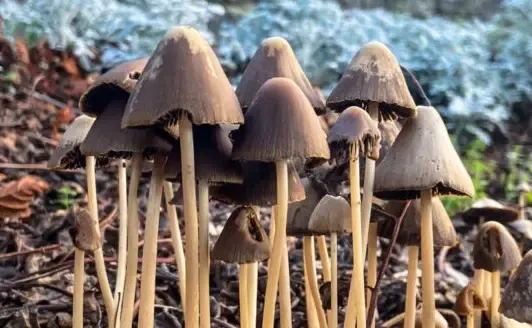Can Psilocybin from Mushrooms Enhance Health for Parkinson's Patients?

Synopsis
Key Takeaways
- Psilocybin shows promise in treating mood dysfunction in Parkinson's patients.
- The study involved a small group of participants, indicating the need for further research.
- Significant improvements in mood and motor functions were observed post-treatment.
- The research highlights the connection between mood symptoms and physical decline in Parkinson's.
- This marks a pioneering exploration of psychedelics in neurodegenerative diseases.
New Delhi, April 30 (NationPress) While psilocybin — a natural compound derived from specific mushrooms — has demonstrated potential in alleviating depression and anxiety, a recent study has revealed its positive impact on elevating mood and improving motor functions in individuals suffering from Parkinson's disease.
Researchers from the University of California San Francisco discovered that psilocybin can serve as a therapeutic aid for Parkinson's patients, who frequently endure significant mood disturbances alongside their motor issues and often do not respond effectively to conventional antidepressants or other treatments.
The research involved a pilot study of seven men and five women diagnosed with mild to moderate Parkinson's disease. Participants were administered a 10 mg dose of psilocybin, followed by a higher 25 mg dose two weeks later.
Published in the journal Neuropsychopharmacology, the results indicated that the drug was well-tolerated, with no severe side effects or aggravation of symptoms.
This pilot study also noted clinically significant enhancements in mood, cognition, and motor skills, effects which persisted for weeks after the substance had cleared from the participants' systems.
This marks the first instance of a psychedelic being evaluated in patients with any neurodegenerative disorder.
“We are still in the very early stages of this research, but the initial findings exceeded our expectations,” stated Ellen Bradley, Assistant Professor and associate director of UCSF's Translational Psychedelic Research Programme (TrPR).
“Many individuals are unaware that mood disorders in Parkinson's correlate with a more rapid physical decline,” she noted. “They also serve as a more accurate predictor of life quality in Parkinson's patients compared to their motor symptoms.”
Parkinson's disease is a progressive neurodegenerative disorder characterized by uncontrolled movements resulting from abnormal brain activity.
Although treatments like levodopa can alleviate symptoms, there are currently no approved therapies that can decelerate the disease's progression or reverse its effects.
Common early symptoms include tremors and shuffling gait; however, Bradley remarked that anxiety and depression often manifest in patients without prior psychiatric issues years before the appearance of motor symptoms.
The reasons behind the ineffectiveness of standard medications for these patients remain unclear, but mood alterations may be integral to the neurodegenerative process, according to the research team.










